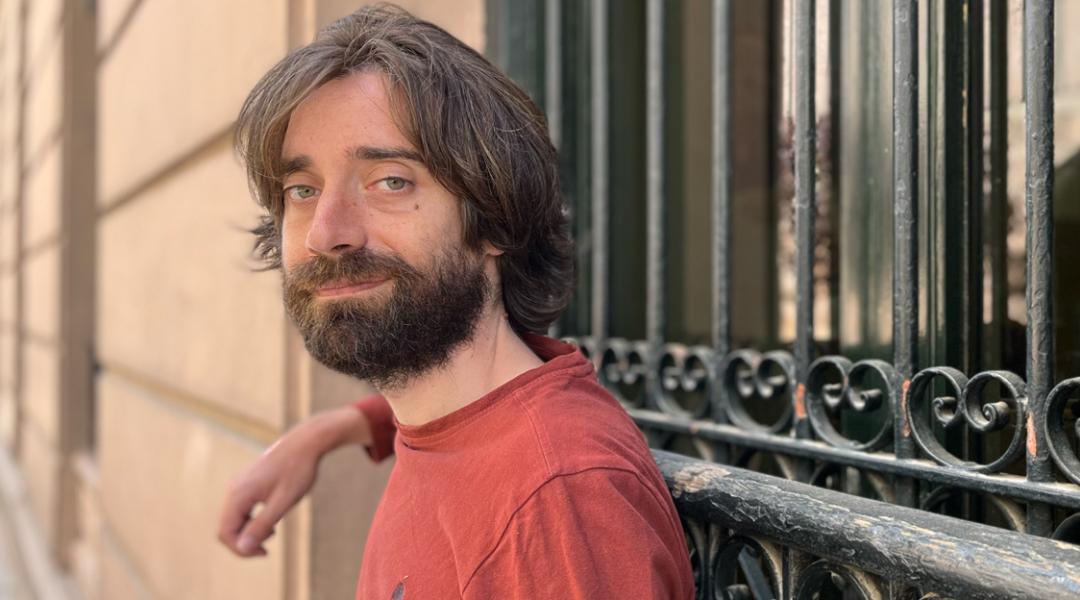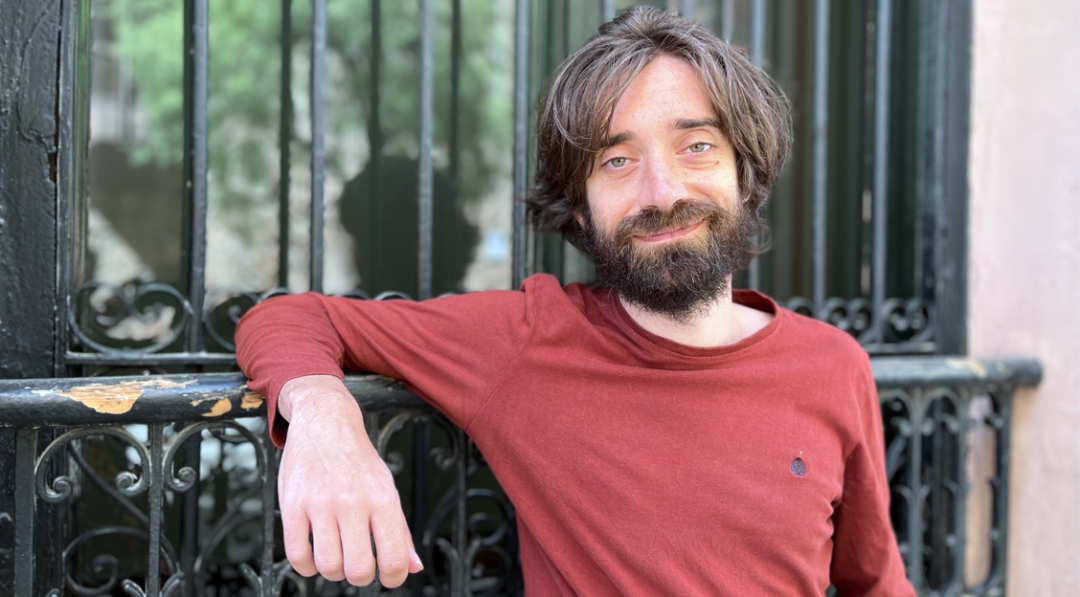Juan Gómez Bárcena
A thousand stories at a time

This writer returns to the Madrid Book Fair with ‘Lo demás es aire’, a novel set in the small village of his childhood, in Cantabria: Toñanes, a place strangers go by without a second glance but that, nevertheless, contains four centuries of history. The stories of the lives of its residents —and of the writer himself— blend in a piece where time twists and turns, and where reality and fiction rebuild the pulse of a community seemingly frozen in time.
Juan Gómez Bárcena (Santander, 1984) confirms that when writing Lo demás es aire [Everything else is air], his fourth novel, he wanted the reader to “imagine a specific place, to rebuild the history of that place”. The exact spot is Toñanes, a tiny town in Cantabria. The writer simply calls it “my village” throughout our conversation. Two square kilometres, one-hundred residents —according to the most optimistic censuses—, around two-hundred cows: one of those places that you quickly leave behind when travelling from point A to point B, one of those that you see in the rear-view mirror and that you cross in less than a minute and a half.
“People’s lives are the real story, not big events. I wanted to write a novel that started and ended with a car journey that goes through a village where time seems to have come to a standstill. And show what’d happen if those people that go by would stop and see what had happened in that place in four centuries,” he explains. If Kanada (2017) is set in communist Hungary, and Ni siquiera los muertos (2000), in colonial Mexico —The Sky Over Lima, winner of the Narrative Critical Eye Award in 2014, fictionalised Peru at the turn of the century—, Juan Gómez Bárcena’s new novel takes an in-depth look at both the history of everyday life and the author’s own roots.
After other novels set in other places and eras, is ‘Lo demás es aire’ like coming home?
Yes, especially because I’d never written a book about a place close to me; I’ve always written books set in other times, and often in spaces that I’ve had a biographical relationship to, but never as strong as this one.
Was there a point, a conscious decision to write this specific novel, or is it a book that’s always been there somehow?
It was quite improvised, although the term improvisation can make you think of something quick, when it was actually really slow. But I started reading up on the village purely to entertain myself —I’m a historian and I was interested in the history of these places—; slowly I started writing some articles and thinking that there was enough material in those articles for a novel. Really, I found myself writing the novel almost unexpectedly, although if you look back, the logical thing would be to think that that novel would be written.
Was it a linear writing process?
I started this book in 2017, but I suddenly didn’t feel capable of bringing it together, so I wrote Ni siquiera los muertos, which was published in 2020. Then, during the pandemic, I wrote for a year and a half and managed to close it: I managed to somehow bring together those diverse materials from different eras and give it a sense of unity.
In this case, does that ending really exist?
There’s a lot left behind. Stories that I removed, stories that I didn’t write in the end, I’m not sure if because shrewdness defeated me —knowing that they wouldn’t work—, or out of laziness... But nevertheless, it is indeed a book that I have a strong feeling of closure with.
Even being your own story?
In an autobiographical sense, obviously no, it doesn’t end (laughs). In terms of documenting the village itself, one could think that one-hundred residents and four centuries of history isn’t much, but its endless.

Winner of the Narrative Critical Eye Award for his novel ‘The Sky Over Lima’, Juan Gómez Bárcena presents his fourth novel at Madrid's Book Fair.. © C.R. Cuesta
Time is a concept that’s explored in many ways, but in Lo demás es aire it follows a formal structure which is particularly striking. When did you decide that all those timelines would reveal themselves like that?
The decision about time was taken relatively quickly, the thing is I wasn’t really sure how to solve it. What I was really interested in was trying to show how certain spaces are full of history and how within them we’re having a conversation with the more or less distant past and, at the same time, with an unknown future. And do it from a non-chronological position, precisely so that we could see that dialogue. Then I started to think I needed to capture time simultaneously.
That’s why there are dates annotated on the margins...
Yes, that’s when I thought about using the same resource I’d seen in parish books where priests write down the dates of christenings or deaths.
“We live off stories and feed off those stories because they’re what hold up our identity”
In the end, what comes first, the context or each of the stories that make up the novel, in all their timelines?
It’s true that, in the beginning, I thought of the novel globally, and then I started to think about the types of texts I wanted it to include: it alternates interviews, tales, documents, and what I call “synchronous chapters”, where you see everything at once... That’s the structure I had in mind. That became an important and painful task: there are several characters I found interesting and that I ended up not writing or deleting afterwards.
A bit like Gonzalo Torrente-Ballester's The Saga/Flight of J.B?
I love the comparison, of course (laughs). The idea of the circularity of time...
Is it the past or the story we build about that past what marks and creates that circularity?
Indeed, it is so in the history of villages and of people. Sometimes when you go to therapy it’s because you’re not satisfied with the story that’s been told about your past and you want to tell a new story, and the same thing happens with societies. We live off stories and feed off those stories because they’re what hold up our identity. For me, it’s just as important to show those historical events that were crucial at one time as the little things that have nevertheless left their mark. It could be the memory of an object, or a tale that stands the test of time. It’s something that fascinates me: what survives and what gets lost in our memory.
Therefore, does the author always end up appearing in all works, even without meaning to?
Yes. Always. I’d say even in my more distant books... Inevitably we add parts of ourselves to our works, and the opposite is also true: when we try to be autobiographical, we include external elements.
Do you write from that story you’ve built about yourself?
Of course, and in a story where there are deliberate lies, distortions, strategic oversights... You’re telling a story that despite trying to be autobiographical, is fiction.
“I try to tell things from new perspectives, and a new perspective usually requires a change in format”
So many voices, so many eras in a single novel, is this a way of putting your talent as a writer to the test when you come to a certain point in your career?
I don’t write with the idea of testing myself, but it’s true that, one way or another, perhaps I do because each time I set myself greater challenges in a narrative sense. It’s not so much about the pleasure of the challenge, but rather because I try to tell things from new perspectives, and a new perspective usually requires a change in format. I’m not interested in formal challenges for their own sake: sometimes you read books and you can tell the author has put themselves to the test, but can that resource be justified in a narrative sense? I like to think that in my novels —especially the last two, which include quite strong challenges— the challenge is justified by what I wanted to tell.
But what is talent?
I’m not sure I’d know how to define talent, but as a creative writing professor, I can give you the answer I give my students when they ask me: “Am I talented?”. I think by talent we usually mean only one part of what it really is: just that potential, that ability to create —in the case of Literature— based on the models of books we’ve read, or even life as a model. And that’s true, but I think that another part of talent is the personality. If all that potential, that ability, is there, but our personality keeps us from carrying it out, I’m not sure that it can be considered talent by itself. At least in my field, it’s the author’s personality that faces a failed novel from a different angle, or the many obstacles to a literary career, perseverance... I believe true talent lies in the combination of both things, ability, and personality.


